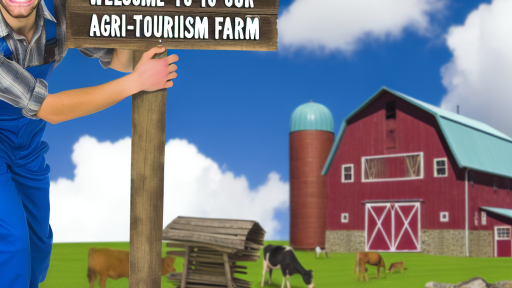Introduction to Local Food Sourcing
Local food sourcing plays a critical role in sustainable farming.
This practice connects farmers directly with consumers.
By sourcing locally, farms can thrive economically.
Moreover, it reduces the overall carbon footprint.
Transportation emissions significantly decline with local sourcing.
Economic Advantages
Local food sourcing boosts the local economy.
Farmers keep more of the money from their sales.
Additionally, it creates jobs within the community.
Local businesses often benefit from purchasing fresh produce.
This collaboration fosters economic resilience.
Environmental Impact
Sourcing food locally lessens the impact on the environment.
It fosters biodiversity by supporting local ecosystems.
Furthermore, local farms typically use fewer resources.
This practice promotes sustainable land use and conservation.
Healthy soil and water resources are preserved.
Transform Your Agribusiness
Unlock your farm's potential with expert advice tailored to your needs. Get actionable steps that drive real results.
Get StartedCommunity Connections
Local food sourcing strengthens community ties.
It encourages relationships between consumers and growers.
Farmers’ markets often become social hubs in neighborhoods.
People enjoy sharing stories and traditions about food.
Education on sustainable practices becomes more accessible.
Freshness and Quality
Locally sourced food often surpasses quality expectations.
Fresh produce tastes better and retains more nutrients.
Harvesting close to sale time maximizes flavor and freshness.
Additionally, fewer preservatives are typically used.
This commitment to quality enhances public health.
Economic Benefits of Local Food Sourcing for Farmers and Communities
Increased Revenue for Local Farmers
Local food sourcing boosts farmers’ profits significantly.
Farmers can sell their products at higher prices directly to consumers.
This method reduces transportation costs and middlemen fees.
As a result, farmers keep a larger share of the sales revenue.
Support for Local Economies
When consumers buy local, they stimulate their local economies.
Local food purchases keep money circulating within the community.
Increased spending in local farms means more jobs for residents.
Additionally, local sourcing supports local businesses, such as restaurants and markets.
Strengthening Community Connections
Local food sourcing fosters strong connections among community members.
Farmers’ markets provide spaces for people to interact and build relationships.
These connections promote community engagement and cooperation.
Furthermore, they lead to increased social capital within the community.
Health and Nutrition Benefits
Consuming local food promotes better health and nutrition.
Fresh produce tends to have higher nutrient content than shipped goods.
Showcase Your Farming Business
Publish your professional farming services profile on our blog for a one-time fee of $200 and reach a dedicated audience of farmers and agribusiness owners.
Publish Your ProfileAdditionally, local sourcing encourages a greater variety of foods.
Communities often embrace seasonal produce, enhancing dietary diversity.
Environmental Sustainability
Local food sourcing significantly reduces carbon footprints.
Shorter transportation distances lower greenhouse gas emissions.
Moreover, it encourages sustainable farming practices.
Responsible practices promote soil health and biodiversity.
Education and Awareness
Local farms often engage in community education initiatives.
Workshops and farm tours raise awareness about sustainable agriculture.
These programs inform consumers about the benefits of local sourcing.
Consequently, individuals become more aware of food origins and sustainability.
Environmental Advantages of Local Food Sourcing
Reducing Transportation Emissions
Local food sourcing minimizes the distance food travels from farm to table.
This leads to a significant reduction in transportation emissions.
Less fuel consumption directly lowers greenhouse gas emissions.
Moreover, shorter supply chains reduce the overall carbon footprint.
Promoting Sustainable Practices
Local farmers often practice sustainable methods of agriculture.
These methods enhance soil health and biodiversity.
Additionally, they utilize fewer chemical fertilizers and pesticides.
Consequently, the local ecosystem benefits from healthier farming practices.
Encouraging Seasonal Eating
Buying local encourages consumers to eat seasonally.
This practice supports the natural growth cycles of crops.
Consequently, it reduces reliance on energy-intensive food production methods.
Seasonal eating also contributes to a diet rich in fresh, nutritious foods.
Strengthening Local Economies
Local food sourcing stimulates community economies.
It helps create jobs and supports local farmers.
Therefore, money spent on local produce often stays within the community.
This economic boost leads to a more resilient local food system.
Delve into the Subject: Seasonal Eating Advantages for Local Farmers
Enhancing Food Security via Local Food Systems
Building Resilience in Communities
Local food systems strengthen community resilience.
They reduce reliance on distant food sources.
This approach minimizes disruptions during crises.
Communities can maintain access to nutritious food.
Furthermore, local production supports local economies.
Improving Access to Healthy Food
Local sourcing enhances food accessibility.
It brings fresh produce closer to consumers.
As a result, people have better options for healthy eating.
Local markets provide diverse food choices.
This variety promotes increased nutritional intake.
Encouraging Sustainable Practices
Local food systems promote sustainable agricultural practices.
These practices reduce carbon footprints associated with transportation.
Additionally, they encourage organic farming methods.
Showcase Your Farming Business
Publish your professional farming services profile on our blog for a one-time fee of $200 and reach a dedicated audience of farmers and agribusiness owners.
Publish Your ProfileHence, local farming supports environmental stewardship.
Fostering Community Connections
Local food systems create stronger community ties.
They connect consumers directly to farmers.
This relationship fosters trust and transparency.
Moreover, community events raise awareness about local foods.
This engagement encourages collaborative efforts for sustainability.
See Related Content: Creating a Local Food Sourcing Business Model
Building Stronger Community Relationships Through Direct Farm-Consumer Connections
Enhancing Local Engagement
Direct connections between farms and consumers foster a sense of community.
This engagement creates loyal customers who value local produce.
Moreover, farmers can promote their unique stories and practices.
Promoting Transparency
Local food sourcing enhances transparency in food production.
Consumers gain insight into where their food comes from.
Farmers can showcase their sustainable practices directly.
Supporting Local Economies
Buying from local farms keeps money within the community.
This supports local jobs and contributes to economic growth.
Additionally, it encourages the development of related businesses.
Encouraging Healthy Eating
Farmers can educate consumers about the benefits of fresh food.
Nutrition workshops can be hosted at local farms.
These initiatives promote healthier eating habits among community members.
Building Trust and Loyalty
Consumers appreciate knowing their farmers personally.
Trust is established through direct interactions and shared values.
As a result, this leads to long-term relationships between farms and consumers.
Discover More: How Farmers Can Embrace Local Food Sourcing

Supporting Biodiversity and Promoting Local Agricultural Practices
Enhancing Local Ecosystems
Local food sourcing significantly enhances local ecosystems.
It promotes a diverse range of plant and animal species.
Consequently, this diversity improves soil health and resilience.
Moreover, it helps maintain local genetic varieties of crops.
Farmers can leverage these varieties for improved yields.
Reducing Environmental Impact
Local sourcing reduces transportation emissions.
By cutting down on food miles, farms can lower their carbon footprint.
Additionally, regional farming practices often use less harmful chemicals.
This approach safeguards water sources and habitats.
Supporting Local Economies
Local food sourcing boosts local economies.
It keeps money within the community and supports local jobs.
Farmers’ markets offer consumers fresh produce directly from growers.
This establishment creates a strong sense of community.
Encouraging Sustainable Practices
Local farms often adopt sustainable agricultural practices.
For instance, crop rotation and organic farming techniques are common.
These methods improve soil fertility and reduce pests naturally.
Furthermore, they can enhance the nutritional quality of food.
Showcase Your Farming Business
Publish your professional farming services profile on our blog for a one-time fee of $200 and reach a dedicated audience of farmers and agribusiness owners.
Publish Your ProfileFostering Community Connections
Buying local fosters direct connections between consumers and producers.
Customers gain a better understanding of their food sources.
In addition, local food initiatives often educate the public.
Workshops and events promote awareness of sustainable practices.
Find Out More: Implementing Local Food Sourcing in Your Farming Plan
Challenges Faced by Sustainable Farms in Local Food Sourcing
Market Competition
Sustainable farms often face intense competition from larger agricultural businesses.
Many of these businesses benefit from economies of scale.
This can make it difficult for small farms to offer competitive pricing.
Consequently, they may struggle to capture market share.
Consumer Awareness
Not all consumers fully understand the benefits of local food sourcing.
This lack of awareness can lead to lower demand for sustainably sourced products.
Farmers might need to invest in educational campaigns to promote their goods.
Ultimately, building a loyal customer base is essential for success.
Distribution Challenges
Sustainable farms frequently encounter logistical barriers in distribution.
Delivering fresh produce to local markets can be costly and time-consuming.
This can limit their ability to reach a broader audience.
Efficient logistics are crucial to maintain product quality and freshness.
Seasonal Variability
Farmers may also face challenges due to seasonal crop production.
Some local foods might only be available during specific harvest seasons.
This variability can affect income stability throughout the year.
Planning for crop rotation and seasonality remains essential for sustainability.
Regulatory Hurdles
Navigating local regulations can be a significant challenge for sustainable farms.
Compliance with health and safety standards often requires additional resources.
Smaller farms may struggle to meet these regulatory demands.
Understanding regulations is vital for operating within the law and succeeding.
Case Studies of Successful Local Food Sourcing Initiatives
Green Valley Farm: A Community-Focused Approach
Green Valley Farm is a prime example of successful local food sourcing.
Located in Oregon, this farm emphasizes community involvement.
They connect directly with local restaurants and households.
This approach enhances their customer base and strengthens local ties.
As a result, they increased sales by 30% in one year.
This initiative promotes sustainability through reduced transportation emissions.
Moreover, it fosters a culture of seasonal eating among community members.
Harvest Share: Empowering Local Producers
Harvest Share is a cooperative that facilitates local food sourcing.
It empowers small producers by providing shared resources and marketing.
This cooperative model allows farmers to pool their produce.
Consequently, they can reach wider markets together.
The initiative has doubled the income for participating farmers.
Furthermore, it educates the community about the benefits of local sourcing.
This creates a loyal customer base that values sustainable practices.
Blue Ridge Locavores: Building a Sustainable Network
Blue Ridge Locavores focuses on creating a local food network in Virginia.
Showcase Your Farming Business
Publish your professional farming services profile on our blog for a one-time fee of $200 and reach a dedicated audience of farmers and agribusiness owners.
Publish Your ProfileThis initiative connects farmers with consumers through a subscription model.
Subscribers receive weekly deliveries of fresh, local produce.
This model significantly reduces food waste and maximizes freshness.
Subscribers also gain access to educational workshops about sustainability.
Notably, this initiative has transformed local agricultural practices.
It encourages more farmers to adopt sustainable methods to meet demand.
The Impact on Sustainability
These initiatives demonstrate the wide-ranging benefits of local food sourcing.
First, they reduce the carbon footprint associated with food transport.
Next, they promote biodiversity by supporting local agriculture.
Additionally, they strengthen the local economy by keeping money within the community.
Furthermore, they foster relationships between consumers and producers.
This connection enhances community resilience against food supply disruptions.
Ultimately, local food sourcing initiatives create a sustainable food system.
Additional Resources
Save on Groceries Now by embracing “Farm to Table” – The …
Building Connections with Your Food: Locally Raised Beef & the …




